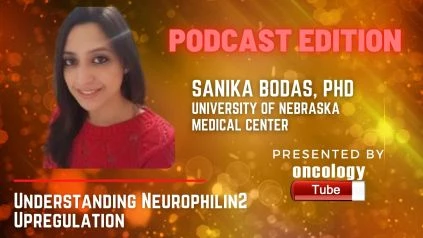Sanika Bodas, Ph.D., Ph.D. Student at University of Nebraska Medical Center. In this video, she speaks about the AACR 2022 Abstract – LB035 / 7 – Understanding the mechanism of neuropilin2 upregulation in advanced prostate cancer.
Â
Observation –
Â
Origins:
Â
Androgen Deprivation Therapy (ADT) is used to treat prostate cancer (ADT). Patients with advanced prostate cancer develop resistance to ADT and progress to a fatal phenotype known as Castration Resistant Prostate Cancer (CRPC). Neuropilin-2 expression is increased in advanced prostate cancer. It has been linked to a decrease in overall survival in these individuals by generating therapeutic resistance.
Importance: Understanding how NRP2 is produced differently would reveal molecular pathways that can be targeted to design an unique therapy plan for improved patient management.
Â
Design of Experiment:
Â
We used pyrosequencing to examine NRP2 expression in multiple prostate cancer cell lines, including LNCaP, C4-2, and C4-2 P53/RB1 null cells (DKD cells), as well as the level of methylation of the NRP2 promoter in these cells. We used 5’Azacytidine to demethylate the NRP2 promoter and then examined NRP2 mRNA expression. We used a GLuc dual-luciferase assay to examine NRP2 promoter activity under demethylated circumstances after transfecting cells with a demethylated NRP2 promoter construct. Using Biobase, we discovered DNA sequences for transcription factor binding within the NRP2 promoter. To identify possible NRP2 transcription factors, RNA-Seq and RT-PCR were used (highly expressed in DKD cells). To confirm SOX2’s role as a transcription factor for NRP2, we used ChIP-q-PCR to examine its binding to the NRP2 promoter. The requirement of SOX2 in transcribing NRP2 mRNA in C4-2 and DKD cells was investigated by knocking it out or ectopically producing SOX2. To see if demethylation of the NRP2 promoter is required for SOX2 binding, SOX2 was overexpressed in LNCaP cells after 5’Azacytidine and the change in NRP2 expression was evaluated.
Â
Outcomes:
Â
In LNCaP cells, NRP2 expression was low. It gradually rose in C4-2 cells, with a sharp increase in DKD cells. Pyrosequencing revealed that LNCaP cells had a higher amount of DNA methylation than C4-2 cells. NRP2 mRNA expression was upregulated in LNCaP cells and considerably increased in C4-2 cells after treatment with 5’Azacytidine. Our dual-luciferase experiment revealed that demethylation increased NRP2 promoter activity, resulting in a substantial increase in Luciferase expression in C4-2 cells. RNA-seq and RT-PCR research revealed that SOX2 levels were up in DKD cells, implying that SOX2 may have a role in increasing NRP2 expression in these cells. In DKD cells, ChIP q-PCR revealed enhanced SOX2 binding in the NRP2 promoter. NRP2 expression was reduced when SOX2 was silenced in DKD cells. Similarly, overexpressing SOX2 in C4-2 cells resulted in a large increase in NRP2 expression, whereas there was no change in LNCaP cells. Demethylation of the NRP2 promoter and simultaneous overexpression of SOX2 in LNCaP resulted in a large increase in NRP2 mRNA, indicating that the demethylated NRP2 promoter is required for SOX2 function.
Â
Implication:
Â
The differential expression of NRP2 in advanced prostate cancer is a two-step process that begins with DNA demethylation in the NRP2 promoter region and is followed by SOX2 binding.

